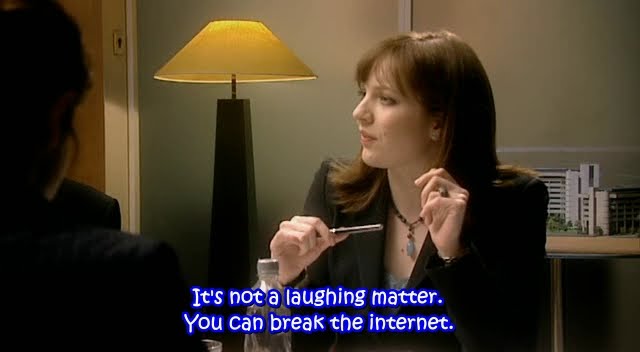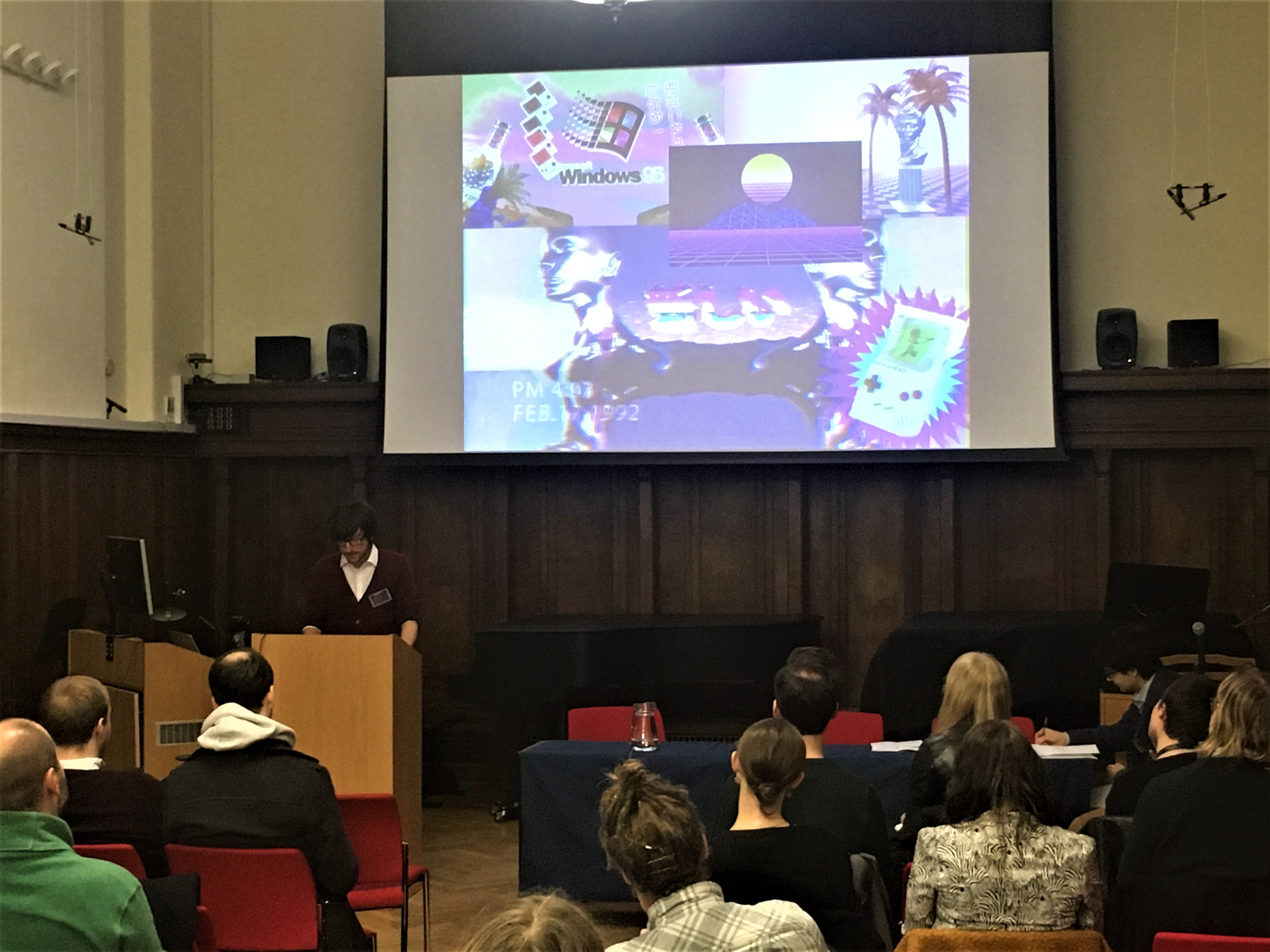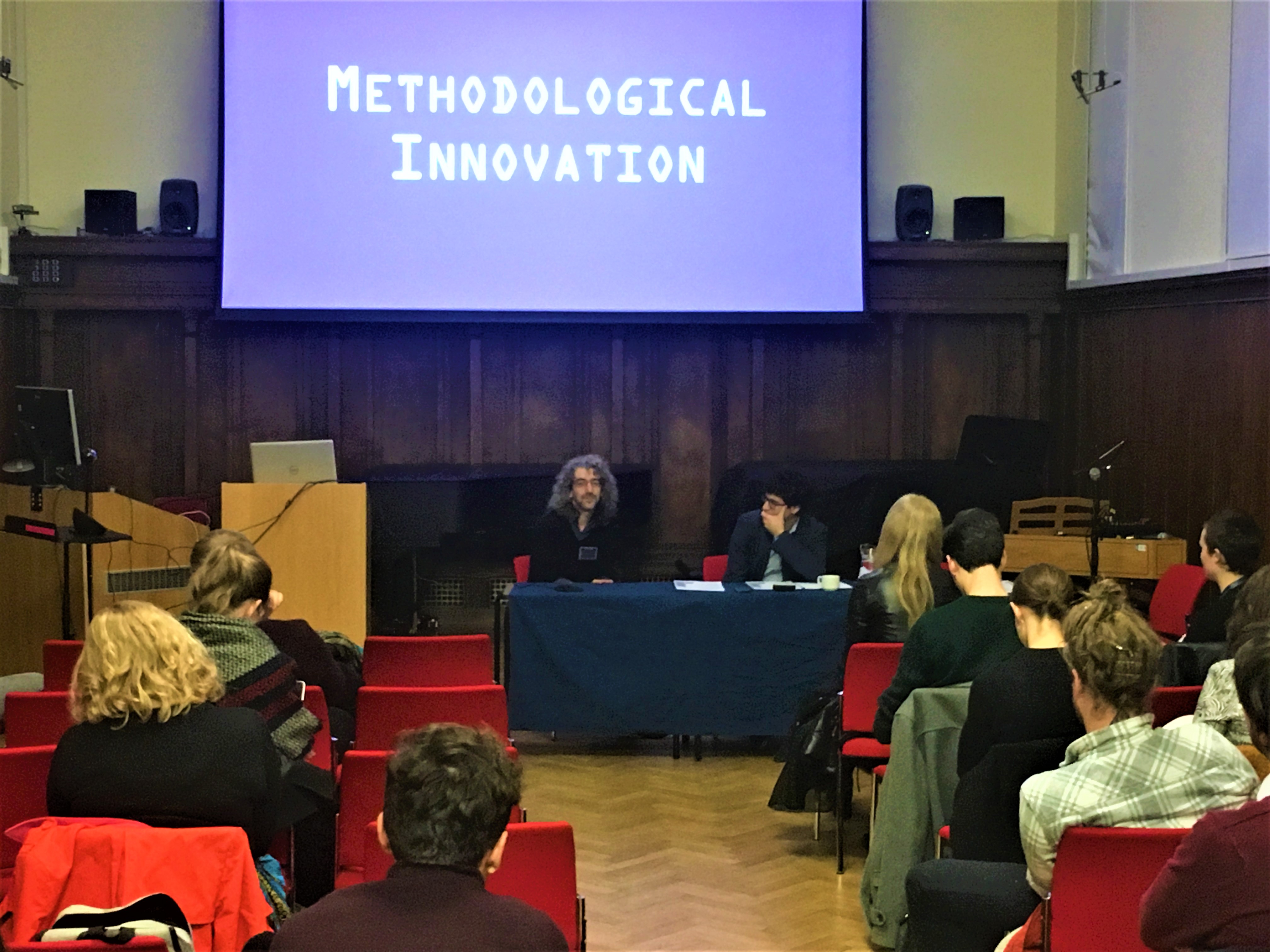The 2018 British Forum for Ethnomusicology & Royal Musical Association Joint Study Day took place on Saturday 8th December 2018 at the Faculty of Music, University of Oxford. The theme of the study day was ‘Music and the Internet’. Organised by Oxford DPhil students Pablo Infante-Amate and Edward Spencer, the event featured three panels, a roundtable on issues relating to online research methodologies, and a keynote address. The study day was interdisciplinary in scope, bringing together musicologists, ethnomusicologists, and popular music scholars, with over three dozen delegates in attendance from Germany, Norway, Spain, the UK, and the USA.
Foregrounding the powerful influence of streaming platforms on music making and listening habits, the participatory musical practices of social media, and the use of the web by musicians in the Global South, this Study Day was the first of its kind to address the multiple entanglements between music and the Internet.
 Can you break the Internet?
Can you break the Internet?
In a discerning keynote address with which the study day concluded, Christopher Haworth (University of Birmingham) alerted us to the danger of treating the Internet as a coherent object of study. He argued that it is necessary to break the Internet down (vertically, as it were) in order to examine how particular histories, protocols, and ‘grammars’ mediate music in specific instances. For large swathes of the paper, Haworth advanced an avowedly media-centric approach in order to offer a close analysis of musical developments and cultural change. In this vein, network computer music (whereby performers interact with others in a different global location via a web connection) can be seen to reanimate the Internet in its original, closed, “halcyon” form (as ARPANET, The Advanced Research Projects Agency Network that pre-figured the 1990s Internet we tend to associate with Tim Berners-Lee). On the other hand, the popular net-native genre vaporwave rekindles an un-curated, anarchic web through its embrace of FTP (File Transfer Protocol) technologies associated with piracy and extralegal music consumption (particularly Megaupload and RapidShare). Notwithstanding this, Haworth was also at pains to highlight the limitations of a media-centric approach, since it tends to be rather post- (or even anti-) human in orientation. It risks obfuscating the ways that creative web users ‘de-scribe’ the inscribed affordances of certain technologies (cf. Akrich 1992).
The Politics of Platforms
This tension between inscription and de-scription underscored the entire Study Day, beginning with the first panel on ‘The Politics of Platforms’. During the Q&A following the papers, James Williams (University of Derby) compared algorithmic optimisation to an unrelenting diet of pasta—platforms such as Spotify only feed us with what we already know, making us all musical bores. Similarly, in his rather pessimistic paper, Thomas Hodgson (King’s College London) focused more on Spotify’s tyrannical inscriptions than on de-scriptive uses of the platform as a technology of the self. It should be stressed that elsewhere, however, Clarissa Brough (University of Southampton) is currently investigating the complex relationship between active user identity work and algorithmic ‘personal recommendations’ on Spotify. More broadly, Yngvar Kjus (University of Oslo) and James Vail (University of Manchester) reflected upon the affordances of different media platforms. Vail included an especially revealing participant quotation in his paper: ‘I don’t want to pay for a digital download because I don’t want to pay for nothing’.
 Popular Music, Participatory Culture, and the Social Web
Popular Music, Participatory Culture, and the Social Web
The middle panel began with a conceptually rich paper on vaporwave by Ross Cole (University of Cambridge). This was perhaps the only presentation to focus on the aesthetics of Internet-mediated music and on what it sounds like to social web users, with Cole focusing on the impossible, utopian space specified by vaporwave’s ubiquitous gated reverb topic. The paper also raised some contentious ontological issues. As Haworth observed, vaporwave does not completely abandon place in favour of space, especially given its obsession with Japanese text, advertisements, and products. Paula Harper (Columbia University) then presented her stimulating idea of ‘Viral Musicking’, a remixed version of Christopher Small’s seminal concept. As Raquel Campos (London South Bank University) mused during the Q&A, Harper’s motif raises various questions to do with agency (since ‘viral’ seems to imply passive reception while ‘musicking’ suggests active engagement). Finally, Steven Gamble (Kingston University London) offered an overview of the online hip-hop mainstream from his position as an ‘Acafan’ (being as it were a hip-hop fan and an academic researcher). This paper was delivered against the contemporary backdrop of SoundCloud rap and online flame wars involving artists and fans, though it did not address these phenomena directly.
Global Case Studies
Whereas the middle panel was haunted by the (mis)use of the social web by musical users, the final panel addressed online behaviours directly. It brought together ethnographic cases from across the world (Nigeria, Cuba, and Iran), offering insights on the ways that musicians utilise the Internet to variously negotiate state censorship, forge alternatives to oppressive regimes, and contribute to global membership efforts. Mike Levine (University of North Carolina) analysed the use of offline USB-based distribution channels in Cuba, while Jaana Serres (University of Oxford) explored online self-branding strategies and the transformation of music markets in Nigeria. Buzzwords throughout this panel were terms like ‘freedom’, ‘liberation’, and ‘emancipation’, all hinting at the powerful possibilities the Internet affords among politically and economically challenging environments in the Global South. But the presenters were quick to note that it is crucial to avoid overly utopian accounts of the Internet. Indeed, online social mediation is also marked by the retention and exacerbation of existing power dynamics and hegemonic structures while also enabling the creation of new forms of inequality. Revealingly, whereas Jasmin Irscheid (University of Oxford) focused on the way that the Internet is used by Iranian rave goers to choreograph resistance, Laudan Nooshin (City, University of London) showed how it reinforces gender inequality in her ethnography of the country’s female classical performers (see also Nooshin 2018).
Closing Remarks
In this final section of the report, we riff on Lisa Blackman’s idea of ‘The Haunted Life of Data’ (Blackman 2015), and focus on themes that hung over the study day yet passed by largely unheard. In doing so, we offer perspectives relating to our own research interests and identify potential areas for future investigation. The first promising theme that in our opinion was largely missing from the Study Day is one relating to the material aspects of music and the Internet. Although music has traditionally been regarded as ‘one of the most ethereal and abstract of cultural forms’, music is in fact thoroughly ‘embedded in the material infrastructures of our daily lives’ (Straw 2012, 227). How are corporate infrastructures and material hardware shaping musicians’ access to, and use of, the Internet? Indeed, how are musicians across the world getting online and how are they meeting the challenges of new or decaying technologies, from laptops to smartphones, fibre optic, and 4G? How are these infrastructures undermining and/or contributing to new forms of media censorship and social control? An approach to music and the Internet via materiality helps to emphasise issues of marginality and access inequality and serves ‘as a counterpoint to arguments for the liberatory potential of the Internet via its immateriality’ (Burrell 2012, 199); it reveals how some Internet users do not ‘join the digital age unproblematically. Instead they [occupy] an unaccounted for in-between space, neither simply connected […] nor disconnected and wholly excluded (Burrell 2012, 183). In this regard, it is crucial to remember that, in many locations of the world, music’s circulation and exchange are not characterised by ‘increasing ubiquity, availability, and fluidity’ (Steingo 2016, 91). Rather, musicians’ daily experiences with technologies are marked by breakdowns, obduracies, and accidents that have not only negative but also generative effects (ibid; see also Larkin 2008). Recent work on the anthropology of infrastructure (Anand, Gupta, and Appel 2018) should encourage researchers to wrangle with questions of materiality and temporality—to take seriously infrastructural inequality as well as musicians’ desires and fantasies about the seemingly infinite possibilities of the Internet.
Secondly, we believe that the study day was haunted by politicised musical trolling tactics and the rise of the sonic meme (D’Errico 2015; Phillips 2015; Milner 2016; Spencer 2017, 2019; Williams 2018). Although some papers were attuned to the competitive and confrontational dimensions of web-based popular music, the important notion of trolling went unnoticed. As Phillips (2015, 8) has argued, ‘trolls are in many ways the grimacing poster children for the socially networked world’. Trolling can be regarded as a highly significant cultural logic in the current decade, one that suffuses the very grammar of the social web and the participatory practices of viral musicking. In recent years, for instance, musical trolling tactics have been weaponised as a form of political propaganda during the rise of the alt-right (Spencer 2017; Williams 2018), vocal samples in successful records have given rise to online misogyny (Spencer 2019), and artists such as Kanye West have trolled their rivals and listeners alike through musical “shitposts” (his 2018 track Lift Yourself being a case in point). Much work remains to be done, however: what specific trolling tactics have been deployed by users of Musical.ly and TikTok, for instance? Finally, we believe that it might be productive to build upon the evocative notion of the sonic meme (D’Errico 2015), a term mentioned in passing by Gamble. What, exactly, is a sonic meme—and why do certain sonic memes come to exist? How are sonic memes used (and abused) by social web users, and when do social web users become reified as sonic memes themselves?
 During the roundtable on methodological issues and innovation, David Lewis (University of Oxford e-Research Centre) stressed the importance of starting with clear research questions relating to music and the Internet rather than with an interesting yet overwhelming wad of data. Similarly, we believe that the field would benefit from more focused objects of inquiry, more engagement with recent and highly relevant Internet Studies literature, increased interdisciplinary research collaboration, as well as heightened attention to the sound of Internet-mediated musics and the sound of their online consumption.
During the roundtable on methodological issues and innovation, David Lewis (University of Oxford e-Research Centre) stressed the importance of starting with clear research questions relating to music and the Internet rather than with an interesting yet overwhelming wad of data. Similarly, we believe that the field would benefit from more focused objects of inquiry, more engagement with recent and highly relevant Internet Studies literature, increased interdisciplinary research collaboration, as well as heightened attention to the sound of Internet-mediated musics and the sound of their online consumption.
Overall, the Study Day was a tremendously inspiring event. Not only did it foreground cutting edge research from across a broad range of disciplines—it also raised a great many compelling questions that encourage further study and the expansion of our nascent research community. The fascinating themes and insights that emerged (not to mention the many high quality abstracts we were unable to accept due to time constraints) provide us with great incentive to apply for further funding in order to organise a larger, multi-day conference in the near future and to pursue publication initiatives. The study of Music and the Internet promises to become a fertile site for scholarly investigation, and we hope that it will continue to gain recognition among university departments and funding bodies. On the final afternoon of the 55th Annual Conference of the RMA (13th September 2019), Christopher Haworth will chair a session featuring papers from three Music and the Internet delegates at the University of Manchester. It is possible or even likely that many of the conversations begun during the Study Day will pick up where they left off during this panel. We hope to see you there!
Edward Spencer & Pablo Infante-Amate
Edward Spencer is a DPhil student in Music at the University of Oxford. His doctoral research investigates the role of ‘the drop’ in Electronic Dance Music (EDM), including a focus on the drop’s involvement in social web trolling as well as in viral dance fads such as the Harlem Shake meme of 2013.
Pablo Infante-Amate is a DPhil student in Music at the University of Oxford. His doctoral research explores the centrality of the state in the constitution of the popular music economy in Equatorial Guinea, and the transformations afforded by a recent oil boom and by the introduction of digital technologies and the Internet.
Photographs by Matthew Machin-Autenrieth.
REFERENCES
Akrich, Madeleine. 1992. ‘The De-Scription of Technical Objects’. In Shaping Technology/Building Society: Studies in Sociotechnical Change, edited by Wiebe E. Bijker and John Law, 205–24. Cambridge, MA: MIT Press.
Anand, Nikhil, Akhil Gupta, and Hannah Appel, eds. 2018. The Promise of Infrastructure. Durham, NC: Duke University Press.
Blackman, Lisa. 2015. ‘The Haunted Life of Data’. In Compromised Data: From Social Media to Big Data, edited by Ganaele Langlois, Joanna Redden and Greg Elmer, 247–271. London: Bloomsbury Academic.
Burrell, Jenna. 2012. Invisible Users: Youth in the Internet Cafés of Urban Ghana. Cambridge, MA: MIT Press.
D’Errico, Mike. 2015. Convergence Media and the Rise of the Sonic Meme, in ‘Electronic Dance Music in the Dubstep Era’. Oxford Handbooks Online. doi: 10.1093/oxfordhb/9780199935321.013.74.
Larkin, Brian. 2008. Signal and Noise: Media, Infrastructure, and Urban Culture in Nigeria. Durham, NC: Duke University Press.
Milner, Ryan. 2016. The World Made Meme: Public Conversations and Participatory Media. Cambridge, MA: MIT Press.
Nooshin, Laudan. 2018. ‘“Our Angel of Salvation”: Toward an Understanding of Iranian Cyberspace as an Alternative Sphere of Musical Sociality’. Ethnomusicology, 62(3), 341–374.
Phillips, Whitney. 2015. This Is Why We Can’t Have Nice Things: Mapping the Relationship between Online Trolling and Mainstream Culture. Cambridge, MA: MIT Press.
Spencer, Edward. 2017. ‘When Play Becomes Political: An Acoustemology of Major League Gaming Montage Parodies (MLGMPs)’. Ludo2017: Sixth Annual Conference on Video Game Music and Sound. Bath: Bath Spa University.
Spencer, Edward. 2019. ‘On Trolling Sounds and Musical Emojis: An Exercise in Web-Based Acoustemology’. 55th Annual Conference of the Royal Musical Association. Manchester: University of Manchester and Royal Northern College of Music.
Steingo, Gavin. 2016. Kwaito’s Promise: Music and the Aesthetics of Freedom in South Africa. Chicago: University of Chicago Press.
Straw, Will. 2012. ‘Music and Material Culture’. In The Cultural Study of Music. A Critical Introduction, edited by Martin Clayton, Trevor Herbert, and Richard Middleton, 227–36. Abingdon, Oxon: Routledge.
Williams, James. 2018. ‘Music, Political Media, and Fake News: The Impact of Viral Propaganda on Generation “M” through Cassetteboy vs. Donald Trump (2016)’. Music and Musicology in the Age of Post-Truth. Dublin: University College Dublin.
